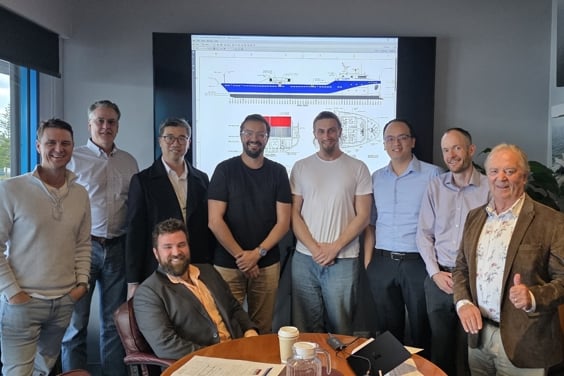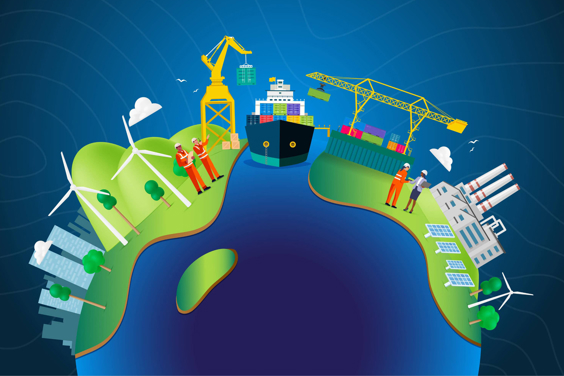Alternative fuel sources for ships: trends and developments
Alternative fuels for ships have become increasingly important in the maritime sector as a response to stricter environmental regulations, giving rise to a host of implications in terms of managing costs and logistical operations. With the growing challenge of climate change, there is now a greater need to find sustainable and renewable marine fuels for this sector.
Fuel for Thought is an insightful and comprehensive series of reports and webinars on alternative fuel sources for ships. Environmental concerns and stringent regulations drive the need for cleaner and greener shipping, and this innovative series provides valuable insights into the challenges, benefits, and practicalities of using alternative fuels.
Greener shipping: the role of alternative fuels
In this series, we will explore the latest developments in this area, including methanol, biofuels, hydrogen, ammonia, and others, examining their potential to transform the shipping industry in the years ahead. Through expert analysis and critical insights, we aim to provide a comprehensive and informative overview of the emerging trends and opportunities in this rapidly evolving field.
Marine fuels: options and innovations
- Ammonia
- Biofuel
- Electric
- Hydrogen
- LNG
- LPG
- Methanol
- Nuclear
Ammonia can be used in a variety of marine engines, including dual-fuel engines that can switch between ammonia and conventional fuels. Its high energy density and low viscosity make it a suitable option for long-range shipping operations.
However, the widespread adoption of ammonia as a marine fuel faces challenges related to storage and bunkering infrastructure. Safe and efficient handling of ammonia requires specialised equipment and facilities, which are currently limited in the shipping industry.
View our ammonia resource hub
Biofuel is emerging as a promising alternative to traditional fossil fuels in the shipping industry, offering a potential pathway to reduce greenhouse gas emissions and advance towards a more sustainable future.
The maritime sector is exploring a wide variety of biofuels, including Fatty Acid Methyl Esters (FAME), hydrotreated vegetable oils (HVO), biomass to liquid (BTL) products, glycerol, and straight vegetable oil (SVO) products.
View our biofuel resource hub
Electric power for ship propulsion is an innovative and environmentally friendly alternative to traditional marine propulsion systems. This technology utilizes electric motors to drive the ship's propellers, offering several advantages over conventional methods.
Electric propulsion systems are typically powered by diesel engines or turbines, which generate electricity to run the propulsion motors. These systems produce less pollution and are more efficient, reducing operating costs and environmental impact.
View our electric resource hub
Hydrogen emerges as a promising candidate, offering the potential for zero-emission operation. Green hydrogen, produced through electrolysis powered by renewable energy, could hold the key to sustainability. When used in fuel cells, it generates electricity with only water vapor as a byproduct, eliminating harmful pollutants.
Hydrogen's low energy density compared to conventional fuels necessitates larger storage tanks, impacting ship design and cargo capacity. Additionally, the technology is nascent, with infrastructure for production, distribution, and bunkering still in its early stages. Several initiatives are underway with pilot projects of hydrogen-powered vessels potentially demonstrating the feasibility of this technology. Research focuses on improving storage methods and developing efficient engines.
View our hydrogen resource hub
LNG (Liquefied Natural Gas) is increasingly being adopted as a fuel for shipping due to its potential to significantly reduce emissions, making it a more environmentally friendly option compared to traditional marine fuels. The maritime industry is exploring LNG as part of its strategy to move towards greener and more sustainable operations. This shift is driven by the need to comply with international regulations aimed at reducing greenhouse gas emissions from ships, as well as the industry’s commitment to environmental goals.
View our LNG resource hub
Liquefied Petroleum Gas (LPG) is emerging as a promising alternative fuel for the maritime industry, offering a cleaner, more sustainable option for powering ships. As the shipping sector seeks ways to reduce its environmental footprint, LPG stands out due to its lower greenhouse gas emissions and near elimination of sulphur emissions compared to conventional maritime fuels.
The International Maritime Organization’s (IMO) stringent regulations on sulphur content have propelled the adoption of LPG as a ship fuel. LPG’s ability to comply with both local and global sulphur restrictions, coupled with its reduction in nitrogen oxide (NOx) emissions, positions it as an attractive solution for the industry. Moreover, LPG’s existing global infrastructure, including storage and loading facilities, supports its viability as a marine fuel.
View our LPG resource hub
Methanol, a versatile and readily available chemical that can be produced from a variety of renewable sources and is being considered as one of the potential alternative fuels for shipping as the sector continues its journey towards decarbonisation.
The world is constantly in search of new and innovative ways to reduce its dependence on fossil fuels and move towards clean energy sources. One such option that has gained increased attention in recent years is methanol.
View our methanol resource hub
Nuclear is emerging as a potential game-changer for the shipping and offshore industries. Nuclear-powered ships, while not a new concept, could offer a significant reduction in greenhouse gas emissions compared to traditional fuels.
Nuclear power stands out for its unparalleled energy density, millions of times greater than that of conventional fuels, and its ability to operate without emitting any SOx, NOx, CO2, or particulates. It’s a technology with a proven safety record in naval applications, and now, it’s poised to make waves in commercial shipping, particularly for deep-sea voyages.
View our nuclear resource hub
Frequently Asked Questions
The best alternative fuel for ships depends on several factors, including environmental impact, availability, cost, and technological readiness. Potential options include Liquefied Natural Gas (LNG) with its reduced emissions and mature technology, despite concerns about methane slip – an issue which is currently being addressed. Biofuels offer a renewable option with a lower carbon footprint, though they face availability and cost challenges. Methanol produced from renewable sources presents a low-emission alternative but requires engine modifications. Hydrogen and ammonia (e- and blue fuels), both promising near-zero emissions, face hurdles in storage, handling, and current high production costs. Electric batteries provide an efficient solution for short distances and smaller vessels but are limited by energy density and range for long-distance shipping. Nuclear power, with its high energy density and zero operational emissions, faces significant regulatory, safety, and public perception challenges. Ultimately, the optimal fuel depends on vessel types and operational needs.
The future fuel mix for shipping and logistics is likely to be a combination of alternative options such as ammonia, biofuels, electric, hydrogen, LNG, LPG, methanol and nuclear. The demand for low carbon fuels is being driven by the need to drastically reduce greenhouse gas emissions and meet stringent environmental regulations.
Zero carbon fuels are defined as energy systems that have the potential to deliver ship power with net-zero carbon dioxide emissions, inclusive of production and use.
Ammonia, biofuels, hydrogen, methanol, and nuclear solutions can all be considered net-zero, or near net-zero, if they are produced from sustainable natural resources. All these options represent the forefront of zero-carbon shipping fuels, offering a pathway to significantly reducing the maritime industry's carbon footprint.
Navy ships usually use a type of fuel known as Naval Distillate Fuel, or NATO F-76, which is a refined form of diesel fuel specifically designed for military use. However, some Navy ships, particularly larger vessels such as aircraft carriers and submarines, are powered by nuclear reactors. Nuclear propulsion provides the advantage of extended endurance and virtually unlimited range without the need for refuelling, which is critical for maintaining strategic mobility and operational readiness.
Cargo ships predominantly use bunker fuel, although there is a shift towards cleaner alternatives due to environmental regulations.












